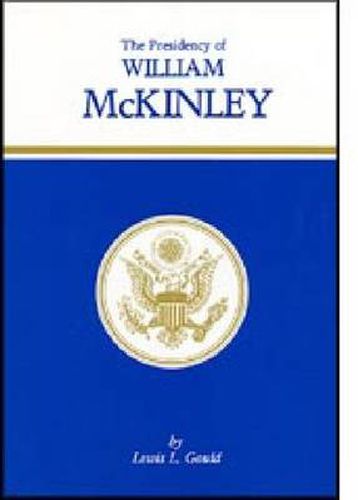The Presidency of William McKinley
Lewis L. Gould

The Presidency of William McKinley
Lewis L. Gould
This title is printed to order. This book may have been self-published. If so, we cannot guarantee the quality of the content. In the main most books will have gone through the editing process however some may not. We therefore suggest that you be aware of this before ordering this book. If in doubt check either the author or publisher’s details as we are unable to accept any returns unless they are faulty. Please contact us if you have any questions.
In this interpretation of the McKinley presidency Lewis L. Gould contends that William McKinley was the first modern president. Making use of extensive original research in manuscript collections in the United States, Great Britain, and France, Gould argues that during McKinley’s four and a half years in the White House the executive office began to resemble the institution as the twentieth century would know it. He rejects the erroneous stereotypes that have long obscured McKinley’s historical significance: McKinley as the compliant agent of Mark Hanna or as an irresolute executive in the Cuban crisis that led to war with Spain. He contends that McKinley is an important figure in the history of the United States because of the large contributions he made to the strengthening and broadening of the power of the chief executive. While this volume touches on many aspects of McKinley’s leadership, the core of it relates to the coming of the Spanish-American War, the president’s conduct of the war itself, and the emergence of an American empire from 1898 to 1900. According to Gould, the Spanish-American War was not the result presidential weakness or of cowardice before public hysteria. McKinley sought to persuade Spain to relinquish Cuba peacefully, turning to war only when it became apparent that Madrid would never acquiesce.
During the war, McKinley effectively directed the American military effort and the diplomacy that brought territorial acquisitions and peace. The process of making peace with Spain–involving, as it did, American annexation of the Philippines–and of securing the ratification of the resulting treaty in the Senate underscored McKinley’s expansive view of presidential power. He functioned as chief diplomat, from the sending of senators on the peace commission to the personal supervision of the terms of the negotiation. At home he made tours of the West and South in 1898 to lead popular opinion to his position as no president had done before him. For the Senate he evidenced a readiness to dispense patronage, woo votes with personal persuasion, and marshal the resources of the political system behind his treaty.
Later episodes in McKinley’s administration support Gould’s thesis. In administering Puerto Rico and Cuba and in suppressing an insurrection in the Philippines, McKinley relied further on the war power and continued to shape affairs from the White House. He sent troops to china during the Boxer Rebellion in 1900 without congressional authorization, governed the new possessions through presidential commissions, and allowed Capitol Hill only a subsidiary role in the process. By 1901 the nation had an empire and a president whose manner and bearing anticipated the imperial executives of six decades later.
Gould does not argue that McKinley was a great president. He maintains, instead, that what McKinley contributed to the office, the examples he offered and the precedents he set make him an important figure in the emergence of the modern presidency in this century.
This item is not currently in-stock. It can be ordered online and is expected to ship in 7-14 days
Our stock data is updated periodically, and availability may change throughout the day for in-demand items. Please call the relevant shop for the most current stock information. Prices are subject to change without notice.
Sign in or become a Readings Member to add this title to a wishlist.


